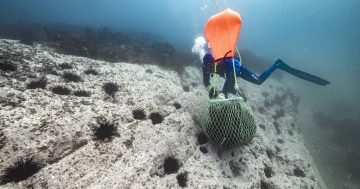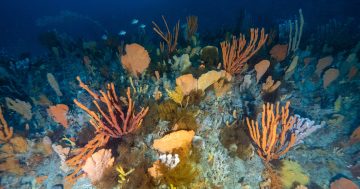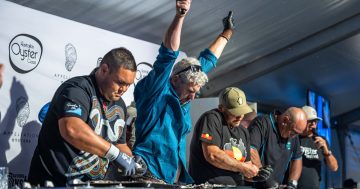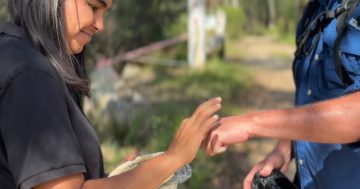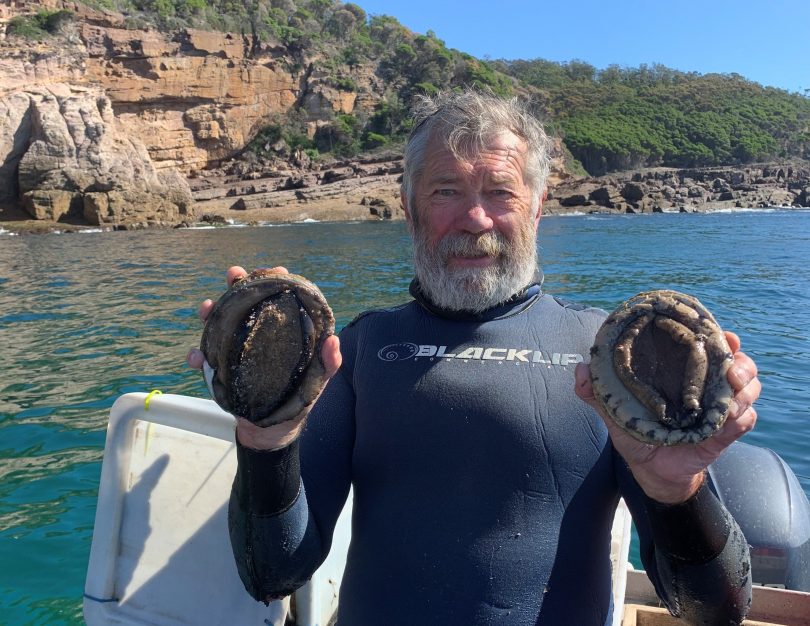
Far South Coast abalone diver and secretary of the Abalone Association of NSW John Smythe holds up two abalone. Photo: Supplied.
Over the past two years the South Coast abalone industry has endured a “perfect storm” of setbacks that has bruised local divers, including a slash by half in the price of the prized seafood since late 2019.
Abalone Association of NSW secretary and Far South Coast diver John Smythe said while there was still a lot of the industry’s quota to be caught, the demand had “shrunk right down” around the country.
He said the industry was enjoying strong markets and high demand before late 2019 when the Black Summer bushfires hit the region.
The resulting chaos knocked out trade for a couple of months, then by the time the markets were ready to reopen the COVID-19 pandemic had arrived.
Since then, the industry has been battered by various factors resulting in only half of NSW’s 100-t quota for the current financial year having been harvested and just over two months left before it resets.
“We’re in our third quota year of an inability to catch our quotas due to a disrupted market,” Mr Smythe said.
Mr Smythe said China was the major market for abalone, while Japan was also important, but restrictions from the pandemic meant their catch could not be exported to these countries.
He added that tourists were a major market for domestic abalone sales so international travel restrictions during the pandemic prompted a downturn in the local market as well.
All this had led to a “perfect storm” of terrible events for the industry, he said.
Mr Smythe said there were 40 abalone quota owners on the NSW South Coast with 25 active divers.
“It’s not a large industry, but it’s been going for a long time and it’s pretty important for the people that are in it,” he said.
“I’ve been in the industry for nearly 50 years. We’ve seen market collapses, but they’ve all been relatively short term and we never had stoppages like we had over the last two years where we couldn’t dive for months on end.”
Despite the difficulties the divers have been coping throughout the turmoil. “It is what it is and we’re just sort of living with it,” Mr Smythe said.
Not all hope is lost, either, as Mr Smythe hopes the market will pick up after June.
He also noted the stock levels of abalone have been improving on the South Coast over the past 10 years due to the many conservation measures implemented over that time. In fact, the past nine months have seen some of the highest catches since the early 1980s.
“It’s actually enjoyable to go diving now when I can, because I can catch rates above what I was getting 20, 30 years ago, so the stocks are improving,” he said.
“It’s much healthier and better than it has been in a long time.”
Meanwhile, TAFE NSW Bega will host a special mental health night and cooking demonstration to support the region’s abalone industry.
As part of Seafood Industry Australia’s Stay Afloat program, aimed at supporting the mental health within the seafood industry, TAFE NSW Bega will host the special event on 11 May in its new commercial kitchen and dining room area.
More than 20 industry participants from the Far South Coast are expected to attend, with mental health support workers on hand and TAFE NSW commercial cookery teacher Dave Arens showcasing some innovative and tasty ways to prepare abalone.
Mr Arens’ creations will then feature in a recipe booklet that will be distributed to restaurants to help stimulate interest in using the product more on local menus.







